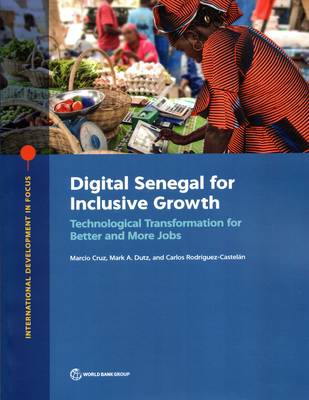
- Afhalen na 1 uur in een winkel met voorraad
- Gratis thuislevering in België vanaf € 30
- Ruim aanbod met 7 miljoen producten
- Afhalen na 1 uur in een winkel met voorraad
- Gratis thuislevering in België vanaf € 30
- Ruim aanbod met 7 miljoen producten
Zoeken
Digital Senegal for Inclusive Growth
Technological Transformation for Better and More Jobs
Marcio Cruz, Mark a Dutz, Carlos Rodríguez-Castelán
€ 61,45
+ 122 punten
Omschrijving
Senegal, like all African countries, needs better and more jobs for its growing population. The main message of Digital Senegal for Inclusive Growth is that broader use of productivity-enhancing technologies by households and enterprises can generate such jobs, including for lower-skilled people. Adoption of better technologies can support both Senegal's short-term objective of economic recovery and its vision of economic transformation with more inclusive growth. But this is not automatic. This book leverages a novel survey instrument that measures adoption of technologies at the firm level. Results from this survey show that there is a large average technological gap in Senegal relative to firms in Brazil, in the range of 36 and 30 percent for extensive (whether firms use it at all) and intensive (the most frequently applied) uses of better technologies such as for business administration. Except for a small number of firms, enterprises still mostly use manual, analog technologies to perform general and sector specific business functions. Micro-size informal enterprises lag even further. The benefits from technology adoption are significant. Digital technologies are an enabler of economy-wide productivity and jobs growth by catalyzing adoption of complementary technologies, including many not accessible without digital infrastructure. For households, mobile internet coverage is associated with 14 percent higher total consumption, as well as a 10 percent lower extreme poverty rate--and jobs with higher earnings. Firms with better technologies have higher levels of productivity, generate more jobs, and increase the share of lower-skilled workers on their payroll, on average: an increase in technological sophistication across general business functions that the firm uses most intensively, such as using standard software rather than writing by hand for business administration, is associated with a 14 percent higher jobs growth rate. For these and other inclusive growth benefits to be realized, Senegal should focus on ensuring availability of affordable digital infrastructure and implementing targeted incentives to promote use by firms of better technologies as well as policies to narrow deepening digital divides across enterprises and households.
Specificaties
Betrokkenen
- Auteur(s):
- Uitgeverij:
Inhoud
- Aantal bladzijden:
- 142
- Taal:
- Engels
- Reeks:
Eigenschappen
- Productcode (EAN):
- 9781464816871
- Verschijningsdatum:
- 27/05/2022
- Uitvoering:
- Paperback
- Formaat:
- Trade paperback (VS)
- Afmetingen:
- 216 mm x 279 mm
- Gewicht:
- 489 g

Alleen bij Standaard Boekhandel
+ 122 punten op je klantenkaart van Standaard Boekhandel
Beoordelingen
We publiceren alleen reviews die voldoen aan de voorwaarden voor reviews. Bekijk onze voorwaarden voor reviews.











